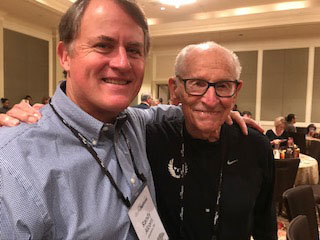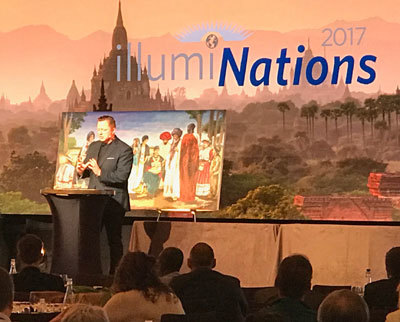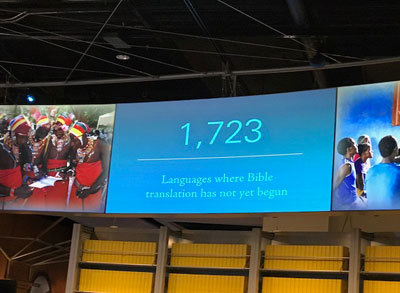Randy Alcorn's Blog, page 123
January 15, 2018
My Writing Process, Advice for Aspiring Authors, and Answers to Other Questions about Writing

The following are questions about writing I answered a few months ago for an article in Today’s Christian Living magazine.
What motivates you to write?
I believe it’s what God has called me to do. Scripture tells us, “Whatever you do, work at it with all your heart, as working for the Lord, not for men...It is the Lord Christ you are serving” (Colossians 3:23-24). Is writing included in the “whatever” I do? Yes. So I do it with all my heart, to the glory of God, as a service to the Lord first and to others second, aware that I must seek to please the Audience of One, my loving Lord. I serve Christ and His people and thank God often for the privilege of being His errand boy, His messenger, His servant. By viewing writing as a ministry first and a vocation only second, I remind myself it’s not about me—it’s about Him.
What are your goals as a writer?
Everything I write is to further an eternal perspective: “We look not at the things which are seen, but the things which are unseen; for the things that are seen are temporary, but the things that are unseen are eternal” (2 Corinthians 4:18). I seek to help readers see the unseen through my writing, both fiction and nonfiction. My prayer is that God would use me as His instrument to represent accurately the truths of His Word and the greatness of His Being.
Where do your ideas come from?
Occasionally a publisher has suggested a specific book idea that I’ve gone with, but usually my books are born out of a passion I feel God has laid on my heart. Often I don’t know where the idea comes from except God developed it within me. I ask Him to direct me toward each project. He has, and I’m grateful to be able to write—everything from detective novels and other-worldly fantasy, to children’s books, to graphic novels, to theological works large and small, on subjects such as money, Heaven, purity, happiness, grace, truth, and suffering.
When and how did you decide to become a writer?
As a student, I really enjoyed writing the term papers lots of people hated, and got encouraging feedback. When I was attending Multnomah Bible College, one of my favorite theology professors, Dr. Joseph Wong, scratched on my term paper: “You should consider being a writer.” I took it to heart, and over 40 years later I’m still grateful.
I wrote my first articles for publication in the late 70s. That’s when I started thinking of myself as a writer. Then in 1983 I started work on my first book, a history of the sexual revolution and its effects on the Christian church. Since then I’ve written over 50 more, the royalties of which are all given away to worthy ministries (nearly $8 million to date). No one is more amazed than I am that there are now over 200 different translations of my books in over 70 languages worldwide.
Did you have any mentors when you started writing?
C. S. Lewis, A. W. Tozer, and Francis Schaeffer were spiritual mentors to me. Tozer didn’t just speak the truth; he spoke it in penetrating ways. He was an editor and a wordsmith. Lewis showed me how the same mind could produce piercing nonfiction and imaginative fiction.
What’s your writing process?
I am a researcher and a perfectionist because I want my books to be just right. I do a ton of initial research; and when I write, I do draft after draft after draft. (I do a lot of my writing at night. I’m usually up until 2 a.m., sometimes 3, when friends and co-workers and readers are asleep, so there are no interruptions.)
I “finish a book” about five or six times. After editing and revising it multiple times on my own, I turn it into a manuscript, usually chapter by chapter, to editors at our ministry. They point out what they don’t understand, and suggest many corrections. I go along with most of them. After all the feedback I finish the chapters another time, and finally finish the whole book a second time and send it to the publisher. And then editing begins on that end. By choice I am highly edited and though I reject some edits and tweak others to my voice, embracing editing makes the book better.
Do you have any unusual writing techniques or strategies?
That’s a tough question to answer because writing is something very private. I have many writer friends, but I don’t sit down with them and watch what they do. We discuss our craft, and certainly people have different writing habits and techniques. I would say I am most distinguished by thorough, nearly exhaustive (and often exhausting) research. I love research, and I immerse myself in it so that as I write nonfiction, and fiction also, I am always drawing from a deep reservoir of prior thought. This makes writing more difficult because I can only use a tiny fraction of what I’ve researched and put into early drafts. But I believe, as a result, what stays in the book is therefore better.
What’s the biggest challenge for you in writing?
For me, the toughest part about being a writer is working on the big books, the ones that take a couple of years. In my research for Heaven I read over 150 books, most of them long out of print. I did this over a three-year period, and of course, the more you research, the more you have to handle, and the more you have to cut. If you do multiple revisions, as I do, it’s easy to lose sight of the end. I had some very discouraging times—with the Heaven book in particular—where I stayed up half the night and asked, “Lord, is this going to make a difference? Is it worth it?”
It’s really something you have to accept by faith, trusting that a measurable result will come, even if the book isn’t read by people for another two years. Perseverance is essential in writing. I sometimes get stretched to the brink. (That’s good, because it takes me to my knees—and apart from Christ we can do nothing.)
What’s your favorite and least favorite part of the writing process?
Writing is both energizing and draining. Sometimes it’s a joy. Sometimes, under deadlines and multiple fourteen-hour work days, it feels like a long battle: you just want to be done. And though a book never feels done, eventually you must turn it in.
Honestly, the hardest part of writing for me is fighting to make the time to actually do it. I have had entire weeks set aside for writing where one thing after another happens to keep me from it. Email is, honestly, the very worst, because it never ends. Even though I have great staff who help me with it, I could easily spend my life doing nothing besides answering email. I must ruthlessly walk away from appointments, emails, texts, and even drop-by visits in order to have time to write.
I think God called me to write and to develop the skill, so I do the hard work with a sense of purpose and calling and joy. And isn’t that what He’s called all of us to do, with the particular skills and opportunities He’s entrusted to us?
How long does it typically take for you to write a book?
It varies widely with the kind of book I’m writing. My comprehensive books, such as Happiness, take a great deal of time to research and write. But in many cases, they have resulted in several spin-off books that take much less to write, not just because those books are smaller, but because I can utilize the research I’ve already done. (For example, in the case of Happiness, I also wrote the shorter book God’s Promise of Happiness and the devotional 60 Days of Happiness.)
Do you ever get writer’s block? If so, how do you work through it?
Actually, I don’t get writer’s block, though certainly sometimes the words flow better than others. I learned long ago that I should never wait for inspiration or a good beginning. I just jump right in. I’ll either cut it out or clean it up later. Years ago I heard someone say, “Never edit at the point of conception.” I think a lot of writer’s block happens when people wait for the right words. I just write. Later, I labor to choose the right words, and there’s no block because I’m already looking at something on the screen.
As you look back over your writing career, is there anything you would change or do differently?
Actually, not much. There were a few projects I didn’t allow myself time to finish, so I had to miss and extend deadlines. I hate doing that. There are times where I’ve felt I’ve painted myself into a corner by over-researching, yet in the end I still feel the research made a better book. There have been a few books where I got behind and became so preoccupied with trying to finish that I feel like I wasn’t being a great husband to Nanci. I would take her out to dinner and watch movies with her, but we both knew the book was hanging over us. I think that’s gotten a lot better over the years. (You should ask her.) That’s something I would change, and I think have changed.
What advice would you give aspiring writers?
Immerse yourself in God’s Word, and study sound doctrine and good theology. (One great book, for reference or to read all the way through, is Wayne Grudem’s Systematic Theology, or his abridged version, called Bible Doctrine.)
Our worldviews permeate both our fiction and nonfiction, and if all we soak in is popular culture, a few hours a week at church won’t be sufficient to give us depth and durability. We need to read great books by great Christian thinkers, both past and present.
If God’s Word is daily at home in your heart and mind, your writing will take on a perspective, and an air of solidity and permanence it won’t have otherwise. God promises His Word won’t return to Him empty, without accomplishing the purpose for which He sent it (Isaiah 55:11). He does not promise that about our words, but His. If we want our words to have lasting value and impact, they need to be touched and shaped by His words—and that won’t happen without a daily choice to expose our minds to Scripture.
Photo by Andrew Neel on Unsplash
January 12, 2018
Meet Orville Rogers, 100-Year-Old Jesus Follower, Generous Giver, and Athlete
 One of the great highlights of the illumiNations event I attended last year was talking with Orville Rogers, who serves Jesus with all his heart, and hearing from him as he was interviewed on stage.
One of the great highlights of the illumiNations event I attended last year was talking with Orville Rogers, who serves Jesus with all his heart, and hearing from him as he was interviewed on stage.
On November 28, 2017, Orville turned 100 years old. In WWII he flew the largest military airplane, the B29 bomber. Over his career as a commercial airline pilot he made $1.5 million total wages. But God blessed his savings and investments and allowed him and his wife to give away over $30 million, mostly to missions. Orville also delivered many airplanes to missionaries on the field.
By the way, Orville holds 16 world running/racing records in various brackets. He started running at 90 years old. Here he is at age 99 coming from behind to win a sprint against a young 92 year old in a photo finish. Orville won by .05 seconds. :)
Orville came to Portland last spring to meet with me and it was an incredible blessing to be with him again in Washington, D.C. He was really looking forward to turning 100 as he figures he may set records that will never be broken by anyone!
Orville has a book out now that tells his story: The Running Man: Flying High for the Glory of God.
January 10, 2018
Working Together, It’s Possible for the Light of God’s Word to Reach Every Language in Our Generation
 Several weeks ago, Nanci and I returned from the illumiNations gathering in Washington, DC. Attending and speaking at the event was a wonderful experience. I want to share some things about it, and explain how you too can be a part of impacting eternity by supporting Bible translation.
Several weeks ago, Nanci and I returned from the illumiNations gathering in Washington, DC. Attending and speaking at the event was a wonderful experience. I want to share some things about it, and explain how you too can be a part of impacting eternity by supporting Bible translation.
illumiNations is a collaboration between a number of translation agencies, including American Bible Society, Pioneer Bible Translators, Seed Company, SIL International, Wycliffe Bible Translators, United Bible Societies, Biblica, Deaf Bible Society, The Word for the World, and Lutheran Bible Translators. These groups do about 90% of worldwide translation work, and together, their mission is to translate the Bible into every remaining language—in this generation.
The organizations began working several years ago to create a central digital Bible library, which they launched in 2010. They’ve since compiled over 1,100 portions and versions of Scripture. They named their collaboration illumiNations, as a reference to Isaiah 60:3, which foretells the nations coming to God’s light: “Nations will come to your light, and kings to your shining brightness” (CSB).
YouVersion explains more:
In the past, getting the Bible into another language—accessing sources, translating, proofing, printing, and finally, distributing it—often took decades. But today, the world’s leading Bible translation ministries collaborate as illumiNations, an alliance created to help them easily exchange ideas, share systems, improve practices, and recruit givers. Working together, they have leveraged advancements in technology, communication, and travel to shorten the translation process, in many cases to just a few years.
Another benefit of their collaboration is that illumiNations now believes that they can have at least the New Testament translated for 99.9% of the world’s population by the year 2033.
 It’s estimated that 1.5 billion people from 6,000 language groups are still waiting for a full Bible in their heart language. And with 1,723 languages where Bible translation has not yet begun, more than 165 million people do not have a single verse of Scripture. But Bob Creson, president of Wycliffe USA, shares that it’s about more than just checking off languages: “The goal really isn’t just to produce a recording or some written materials. The goal is transformation because the Scriptures do transform lives.”
It’s estimated that 1.5 billion people from 6,000 language groups are still waiting for a full Bible in their heart language. And with 1,723 languages where Bible translation has not yet begun, more than 165 million people do not have a single verse of Scripture. But Bob Creson, president of Wycliffe USA, shares that it’s about more than just checking off languages: “The goal really isn’t just to produce a recording or some written materials. The goal is transformation because the Scriptures do transform lives.”
At illumiNations events, donors are “exposed to the global need for translation and matched with the most appropriate translation agency based on their passions for particular regions or people groups,” Christianity Today explains.
Nanci and I were also part of the groundbreaking 2015 gathering, where $20 million was given to further translation efforts. It was unforgettable, as was this year’s. I loved seeing the unity between the translation groups, which was an encouraging model of the cause being greater than the individual organizations.
This year, $49 million was committed by those attending to translate God’s Word into the final 1,600 languages that remain with no Bible. It was, I presume, the largest fundraiser for Bible translation in history. Check out this video recap from the event, which will give you a taste for how powerful it was.
 Nanci and I so enjoyed connecting with many wonderful people who attended. Here’s a picture someone took on an escalator. On the left is Hall of Famer Steve Largent (who needs no introduction to Seattle Seahawks fans) and on the right is Randy Phillips of the music group Phillips, Craig and Dean (who’ve written and performed many familiar songs, including “You Are God Alone,” “Here I Am to Worship,” and “Revelation Song”). Steve and Randy were part of the program too, and we were on a bus together coming back from the National Cathedral.
Nanci and I so enjoyed connecting with many wonderful people who attended. Here’s a picture someone took on an escalator. On the left is Hall of Famer Steve Largent (who needs no introduction to Seattle Seahawks fans) and on the right is Randy Phillips of the music group Phillips, Craig and Dean (who’ve written and performed many familiar songs, including “You Are God Alone,” “Here I Am to Worship,” and “Revelation Song”). Steve and Randy were part of the program too, and we were on a bus together coming back from the National Cathedral.
We also visited the fantastic Museum of the Bible, where illumiNations has a display. I took this picture in a special Bible translation room which shows in yellow, with each blank book named by its eventual language, the remaining languages that still have no Scripture.

This picture shows an African brother holding up a Bible with blank pages, representing the remaining languages until there are no Bibleless people groups left on earth. Impacting eternity by supporting Bible translation is something we can all be a part of through prayer and giving. I encourage you to check out the illumiNations site, where you can sign up for prayer updates and donate towards translation efforts.

“How then will they call on him in whom they have not believed? And how are they to believe in him of whom they have never heard? And how are they to hear without someone preaching? And how are they to preach unless they are sent? As it is written, ‘How beautiful are the feet of those who preach the good news!’” (Romans 10:14–15).
They sang a new song, saying:
“You are worthy to take the scroll
and to open its seals,
because you were slain,
and with your blood you purchased for God
persons from every tribe and language and people and nation.
You have made them to be a kingdom and priests to serve our God,
and they will reign on the earth.” (Revelation 5:9-10)
January 8, 2018
Lessons from the Book of Job

Through Job's story, God offers paradigm-shifting insights to face suffering. In the first chapter, the drama’s Director tells us what the characters don’t know—what’s really going on. Job knew nothing about God commending Job to Satan and calling him blameless. God let Job face terrible trials with no explanation.
We share this in common with Job—God doesn’t specifically explain why He permits evil and suffering to fall upon us. He wants us to trust Him. In one sense, Job is everyman.
Bruce Waltke gives a helpful summary of Job:
In the prologue we observe Job as an idealist in elementary school (chaps. 1–2); in the dialogue, Job is a sophomore in college on the way to becoming wise (chaps. 3–3 1); finally the I AM speeches address him as a student in graduate school, where he is humbled and accepts that there are sufficient reasons to trust I AM without demanding of him rational explanations (37:1–42:6).[1]
God values Job’s faith to the extent that He leaves out what to us seem critical parts of the explanation: God’s wager with Satan, and the fact that God had defended Job as blameless. But the Creator knows what Job needed to know and what he didn’t. He knows the same about us.
My study of Job has taught me many valuable lessons, including these:
Life is not predictable or formulaic.
Most of life’s expectations and suffering’s explanations are simplistic and naive, waiting to be toppled.
When the day of crisis comes, we should pour out our hearts to God, who can handle our grief and even our anger.
We should not turn from God and internalize our anger, allowing it to become bitterness.
We should weigh and measure the words of friends, authors, teachers, and counselors, finding whatever truth they might speak without embracing their errors or getting derailed by their insensitivities.
We should not insist on taking control by demanding a rational explanation for the evils and suffering that befall us.
We should look to God and ask Him to reveal Himself to us; in contemplating His greatness we will come to see Him as the Answer above all answers.
We should trust that God is working behind the scenes and that our suffering has hidden purposes that one day, even if not in this life, we will see.
We should cry out to Jesus, the mediator and friend whom Job could only glimpse, but who indwells us by grace.
Finally, check out this powerful rendition of the final chapters of Job, one of my favorite passages of Scripture. Similar to how life sometimes happens, you may or may not like this at first, but keep watching and I think you will.
For more on suffering, see Randy’s book If God Is Good, as well as the devotional 90 Days of God’s Goodness and book The Goodness of God (a specially focused condensation of If God Is Good, which also includes additional material).
[1] Bruce Waltke and Charles Yu, An Old Testament Theology (Grand Rapids, MI: Zondervan, 2007), 929–30.
Photo by Bryan Minear on Unsplash
January 5, 2018
The Deadly Life of Ease

Jesus isn’t our gofer who exists to run our errands. Rather, He is our Sovereign who gives us what we need while sometimes denying what we want.
We want deliverance from suffering. We want our loved ones to be protected. We don’t want economic crises, natural disasters, job losses, car accidents, or cancer. Our prayers and often our expectations boil down to this: Jesus should make our lives go smoothly. That’s what we want in a Messiah. But it is not what God wants.
Jesus is not our personal assistant charged with granting our wishes. While He often doesn’t give us what we want, He always gives us what we need.
Ironically, the life of ease we most desire is the very kind of life that would make us the people we least admire. Because, let’s be honest, virtually everyone who has suffered little in life seems shallow, unmotivated, self-absorbed, and lacking in character. And yet we do everything we can to avoid challenges, both to our children and to ourselves.
God’s parenting method doesn’t shield us from adversity and the character it builds. He knows the life of ease is deadly to the development of Christlike character.
Perspectives from God’s Word
“And we all, who with unveiled faces contemplate the Lord’s glory, are being transformed into his image with ever-increasing glory, which comes from the Lord, who is the Spirit” (2 Corinthians 3:18, NIV).
“For those God foreknew he also predestined to be conformed to the image of his Son, that he might be the firstborn among many brothers and sisters” (Romans 8:29, NIV).
Perspectives from God’s People
“Jesus, you are righteousness, not my moral coach; my Lord, not my co-pilot; my life, not my concierge.” —Scotty Ward Smith
“If your hope is anchored in Jesus, the worst case future scenario for you is resurrection and everlasting life.” —Scott Sauls
This article is one day’s meditation in the new edition of Randy's book Seeing the Unseen, a 90-day devotional which equips and inspires readers to live today with a right view of eternity. This edition is expanded from the original to include 30 additional daily readings. Each day’s entry includes Bible verses and inspirational quotes.
Photo by Ty Carlson on Unsplash
January 3, 2018
Tim Keller on a Biblical View of Friendship

Some of us are facing difficult times right now. (And any who aren’t will at some point—that’s the nature of life in a world under the Curse.) In hard times, God is absolutely sovereign and loving, but more than ever we need the right kind of friends to visibly live out God’s heart and wisdom for our encouragement, and to help us keep our eyes on our King.
An absolutely true proverb: “One who has unreliable friends soon comes to ruin, but there is a friend who sticks closer than a brother” (Proverbs 18:24).
C. S. Lewis said, “The next best thing to being wise oneself is to live in a circle of those who are.”
He also asked, “Is any pleasure on earth as great as a circle of Christian friends by a good fire?”
I appreciated the below sermon from Tim Keller, on a biblical view of friendship. He has some great insights on the kind of friend to be and the kind of friend to look for.
While Nanci is my closest friend, I have a number of good friends, including one who’s been my closest brother now for 45 years, from when we were teenagers, shortly after coming to Christ. Both of us grew up in unbelieving homes. He and I love this message of Keller’s. I think you might, too.
Photo by Joseph Pearson on Unsplash
January 1, 2018
Pursue Your Relationship with Jesus and Find Your Happiness in Him in the Coming Year

Several years ago I was asked what things believers can do to pursue an authentic, meaningful relationship with God. Here are my suggestions, which are the same now as they were then:
Set aside time every day to spend with the Lord, reading His word, praying, listening to Him.
Read books that draw on the power of Scripture. Feed your heart and your mind.
Listen to sermons, worship music, and Scripture as you go about your day-to-day activities such as driving or doing the dishes.
Fellowship with other Christians within the church, the body of Christ.
Turn off the distractions in your life, whether that’s social media, the internet, television, etc.
I encourage you to consider how you can put these suggestions into practice in 2018, and find deeper happiness in knowing Jesus.
One thought on reading Scripture and building godly habits: countless Christians believe that Bible reading is their duty—something holy people do. What many don’t understand is exactly what Scripture really tells us: that meditating on God’s Word can and should delight us, infusing us with heartfelt happiness (see Psalm 1; the world translated “blessed” is asher¸ which means “happy”). David said of God’s words, “More to be desired are they than gold, even much fine gold; sweeter also than honey and drippings of the honeycomb” (Psalm 19:10). Throughout the difficulties and joys that 2018 will bring, you’ll find abiding happiness as you go back to God’s Word again and again.
There’s an age-old tradition of Christ-followers who have found their deepest happiness in their Lord. We should eagerly join them and say with English Puritan John Flavel (1627–1691), “Christ [is] the very essence of all delights and pleasures, the very soul and substance of them. As all the rivers are gathered into the ocean . . . so Christ is that ocean in which all true delights and pleasures meet.”
Below are some related articles about pursuing Christ in the coming year you might like to check out:
A New Year’s Resolution from Philippians 3: “I Want to Know Christ”
Planning Your New Year and Making God’s Word a Priority
How Can I Stay Motivated in My Relationship with Jesus Christ?
How to Begin a Bible-Reading Habit in 2018
Also, check out Tim Challies’s 2018 Christian Reading Challenge, which will encourage you to read more and to broaden the scope of your reading. (He offers a free download of the challenge graphic you can print to keep yourself on track.)
And if you’re looking for a new daily devotional for the new year, see my books 60 Days of God’s Happiness, Grace, Truth, We Shall See God (with excepts from Charles Spurgeon’s sermons), and Seeing the Unseen.
May your 2018 be filled with the deep, abiding joy and happiness of knowing Jesus Christ!
Photo by Rakicevic Nenad on Unsplash
December 29, 2017
Constant Explanations from God Wouldn’t Allow for Our Faith or Trust

Sometimes we make the foolish assumption that our heavenly Father has no right to insist that we trust Him unless He makes His infinite wisdom completely understandable to us. But if God offered us constant explanations for the circumstances we face, our lives would not be free or normal, and would not allow for faith or trust.
I think of my friend John Franklin, who was playing softball when he was then a healthy thirty-nine-year-old. John developed a headache and neck pain, so he took himself out of the game. By the time the game finished, he needed help walking.
Taken to the hospital, John became completely paralyzed and unable to speak. Soon he was breathing with a ventilator. John spent seven weeks in ICU and another four months in the hospital. He underwent speech therapy, then a few years of occupational and physical therapy. Now, over twenty years later, John remains restricted to a wheelchair. Doctors never discovered why it happened.
John’s youngest son, six years old when his father became disabled, wrote me, “I remember always being so mad that God did this to him. One day I asked my dad why he wasn’t angry. He said, ‘Why should I accept good from God and not evil?’ I think my jaw dropped and at the time I was angry at him for saying that. But that experience has forever shaped my view of God and evil.”
This wonderful family has certainly seen God at work. But they still have no clear explanation of his purpose for John’s disability.
Consider what our lives would be like if God regularly explained to us why He allows everything that disappoints us.
Suppose you’re a teenage girl, sick on prom day. God could whisper, I let you get pneumonia so you wouldn’t bond with that young man who wouldn’t be right for you, and so your parents would go get you your favorite dessert, where they’ll see a help-wanted poster and tell you so you apply and get the job, and meet the girl who will become your best friend and help you twenty years from now when your husband gets cancer, and...
“Whoa! My husband? What’s he like? And why would you let him get cancer?”
In order to make you more Christlike and help you become more of a servant and...
“But I don’t want to be a servant. And cancer terrifies me!”
...and teach your husband to depend on me, and draw your children and grandchildren closer to you, and...
“I’ll have children and grandchildren? How many? Girls or boys? But how will they deal with their father’s cancer?”
Do you see where this is going? And it’s just one “simple” event. How could God explain His purposes without revealing to us the life He intends for us to live later, not now? And without imparting the grace that He will give us just when we need it, not in advance?
The God of providence weaves millions of details into our lives and into all the lives around us. Maybe He doesn’t have one big reason for bringing a certain person or success or failure or disease or accident into our lives; in fact, He may have hundreds of little reasons. In order to understand God’s explanations, we would have to be God.1
If you’d like to read more related to the subject of evil and suffering, see Randy’s book If God Is Good, as well as the devotional 90 Days of God’s Goodness and book The Goodness of God (a specially focused condensation of If God Is Good, which also includes additional material). Many people have also handed out the If God Is Good booklets.
[1] See John G. Stackhouse Jr., Can God Be Trusted? (Oxford: Oxford University Press, 1998), 90.
Photo by Cherry Laithang on Unsplash
December 27, 2017
Star Wars Movies Are Fun, Just Remember They Sometimes Contradict a Biblical Worldview

With the release of Episode VIII – The Last Jedi, I’ve been asked again about my views on Star Wars. I enjoy science fiction and I do like Star Wars, especially the original three movies. Nanci and I actually attended, in Portland, the first showing of the original Star Wars in late May 1977, over forty years ago (we started our church earlier that same month). The theater was less than half full. We were blown away by the quality, and by the time we brought friends back to see it the following week, the word had spread and lines to buy a ticket were almost out to the street. (Some of you remember!)
That said, it was obvious even then that Star Wars was fun to watch but a very poor place to get your theology! I am not a Star Wars naysayer, and it might seem self-evident that “these movies aren’t based on reality.” But I’ve found that while almost no one ends up believing that the particular aliens onscreen really exist, matters of worldview are much more subtly conveyed. So I encourage parents to talk with their children about this, since many of them don’t yet have the filters in place to screen out what’s false.
Full of Theology
I can hear some people saying, “What are you even talking about? There’s no theology in Star Wars. These are just some fun movies.” Well, yes, they are fun movies, but if you think they don’t contain theology you are, no offense intended, naïve. Here’s just one example from the second of the original Star Wars movies, The Empire Strikes Back. Yoda is mentoring young Luke Skywalker in Star Wars theology:
“For my ally is the Force, and a powerful ally it is. Life breeds it, makes it grow. Its energy surrounds us and binds us. Luminous beings are we, not this crude matter. You must feel the force around you, here between you, me, the tree, the rock, everywhere, yes, even between land and ship.”
 This is loaded with theology, most of it dead wrong. Where is God the Creator and Jesus the Redeemer in this worldview? Or when Yoda says of his coming death, “Soon will I rest, yes, forever sleep. Earned it I have,” how does this stand up against the biblical worldview of Heaven and Hell? Where is the grace of God offering deliverance from Hell only the basis of faith in Christ offered by His redemptive death on our behalf? Our eternal rest, which is conscious, is not granted on the basis of good works, as Yoda affirms: “Earned it I have.” Compare Yoda’s words with Ephesians 2:8–9 and Titus 3:5.
This is loaded with theology, most of it dead wrong. Where is God the Creator and Jesus the Redeemer in this worldview? Or when Yoda says of his coming death, “Soon will I rest, yes, forever sleep. Earned it I have,” how does this stand up against the biblical worldview of Heaven and Hell? Where is the grace of God offering deliverance from Hell only the basis of faith in Christ offered by His redemptive death on our behalf? Our eternal rest, which is conscious, is not granted on the basis of good works, as Yoda affirms: “Earned it I have.” Compare Yoda’s words with Ephesians 2:8–9 and Titus 3:5.
This errant theology is an opportunity to talk with our children and each other about biblical truth. But if this isn’t done, why shouldn’t we expect a child, especially one who watches the movies repeatedly, to absorb and to a degree, at least, to embrace this false theology?
If kids and parents can sit down, like we did with our daughters when they were young, and discuss the theological errors with “the Force,” that can be very good for them (and us). Everyone has a theology or worldview, of course, you do and I do and George Lucas does. His worldview just happens to have a bigger platform and more pervasive presence than most of ours!
The Dangers of Dualism
So what are the errors in the Star Wars theology and worldview I’m referring to? There are elements of Eastern mysticism and New Age, with sprinklings of pantheism, but the most fundamental and pervasive error is dualism (similar to the Persian religion of Zoroastrianism).
When we teach our kids about the world and the course of events, we need to make clear it is not fate, randomness, or nothingness which control these things, nor is it a whimsical pagan god with limited powers, duking it out with competing gods, and only time will tell who wins. There are not two equal opposite forces in the universe, and who will be victorious is not in doubt! The God of the Bible is utterly unique, transcendent, and personal. And this God, the one true God, is not portrayed in the Star Wars Saga (nor in most other movies of any sort being produced today).
Even among Christians, I sometimes see a sort of evangelical dualism that surfaces. But such thinking is dead wrong—yes, there is evil in the world, of course, and God is not an evil-doer. But the forces of evil are not “the dark side” of God. He has no dark side! God is the all-powerful Force for good, and demons and sinful people are finite and temporary forces for evil. But they are not part of the same force, nor is their ultimate power equal!
In John 9, the disciples wanted to attribute a man’s blindness to human sin, either his or his father’s. Jesus corrected them: “Neither this man nor his parents sinned, but this happened so that the work of God might be displayed in his life” (v.3). We sometimes back away from thinking God actually makes someone disabled. We attribute deformity and imperfection to human sin and to Satan, and there’s a half-truth in that, but only a half-truth (and all heresies are half-truths). God said to Moses, “Who gave man his mouth? Who makes him deaf or mute? Who gives him sight or makes him blind? Is it not I, the LORD?” (Exodus 4:11). Notice God doesn’t merely say “Who allows man to be deaf or mute or blind?” but “Who makes him that way?”
He Has No Opposite
Sometimes when I’ve spoken on this topic, I’ve given a little quiz and ask the audience, to say out loud the first thing that comes to their minds in answer to each of these questions. Please do the same right now, actually speak your answer:
1. What’s the opposite of good?
2. What’s the opposite of above?
3. What’s the opposite of God?
Then I tell them, if you answered “evil” to one and “below” to two, you were correct. But if you answered “Satan” or the devil to number 3, you’re wrong. (Yet in my experience that’s exactly what most Christians answer.)
Here’s the truth, and it’s what breaks the back of all dualism, including Zoroastrianism and the Star Wars theology:
Satan is not the opposite of God. He is the opposite of Michael, the unfallen archangel. This is not a semantic trick—this is the truth. God has no opposite. To make a created being the opposite of the Creator results in many other heresies, not the least of which is thinking that Satan and God are battling to see who can pilot the ship, with the results in question. This is Star Wars theology, not the Bible. Who will win, the dark side or the light side of the force? Dualism is a heresy many Christians buy into without realizing it. We make Satan too big—and far worse, we make God too small.
Yes, Satan is called the “god of this world,” but this is set in an overall context with God being absolutely sovereign. Satan isn’t anywhere close to being all-powerful, omniscient, omnipresent, or anything else that God is. He is capable of great evil influence, but he is ultimately a dog on a leash. (That doesn’t mean God is responsible or accountable for Satan’s actions—indeed, God is accountable to no one.)
 God says “I am the Lord, and there is no other. I form the light and create darkness. I bring prosperity and create disaster; I, the Lord, do all these things” (Isaiah 45:7). Our tendency is to try to be God’s PR people by absolving Him of all disasters. Sure, we can link them to the curse on the earth due to the sin of man, and yes demons do seek to bring disasters on us, but by distancing God from disasters (in a misguided attempt to defend his goodness—which needs no help from us) we end up with a deistic God who just lets the universe go wherever it will, run amok because of our sin. That kind of God isn’t vitally involved in our lives. He does not work all things together for good, like the true God of the Bible.
God says “I am the Lord, and there is no other. I form the light and create darkness. I bring prosperity and create disaster; I, the Lord, do all these things” (Isaiah 45:7). Our tendency is to try to be God’s PR people by absolving Him of all disasters. Sure, we can link them to the curse on the earth due to the sin of man, and yes demons do seek to bring disasters on us, but by distancing God from disasters (in a misguided attempt to defend his goodness—which needs no help from us) we end up with a deistic God who just lets the universe go wherever it will, run amok because of our sin. That kind of God isn’t vitally involved in our lives. He does not work all things together for good, like the true God of the Bible.
An Opportunity to Think Critically
If you would have told me in May 1977 that our children would be surrounded by Star Wars themes as they grew up, I would have doubted you. Had you said that children today would be, I would have thought you were crazy. But Star Wars has taken the world by storm, and while some children won’t watch the movies, the great majority will. Some things are better not to get exposed to, but some our kids will inevitably be exposed to, so it’s important for us to help them think through these issues properly.
Both the Christian worldview and the Star Wars worldview embrace the reality of the supernatural. But they do so in very different ways. The biggest question is, what will our children and grandchildren learn about God from the universe of Star Wars? Will what they learn be true to the Bible, or will it oppose what Scripture teaches?
In my opinion, if—but only if—you and your children know what the Bible says and have discernment, you can watch and read Star Wars, appreciate its portrayal of good doing battle against evil, and not buy into its dualistic belief systems. But we need to be careful with what our children feed their minds on, since their discernment isn’t yet well developed (and they live in a world of children and even many adults who never develop spiritual discernment).
Certainly we can’t expect our children to figure out all this on their own. If we as their parents don’t carefully point out to them the areas in which various stories they read or listen to are true and not true to Scripture, who will?
These articles are a few years old but still may be helpful for those wanting to understand some of the worldview and theological issues with the Star Wars movies:
A Worldview Critique of Star Wars
Why We Get Religious About ‘Star Wars’
The Irresistible Force of ‘Star Wars’: 3 Popular Approaches
Photos: Pixabay
December 25, 2017
Good News of Great Joy: Listen to the Christmas Story from Luke 2

Recently I was filmed reading from Luke 2:1–21 for a video for our home church, Good Shepherd Community Church. I was joined by my wife Nanci and our Golden Retriever, Maggie (who as you’ll see, to our surprise, was very well behaved!).
In the midst of the busyness of Christmas, there’s nothing like getting back to the heart of the “good news of great joy,” and focusing on Jesus Himself. Hope you enjoy hearing from God’s word.
Merry Christmas and Happy New Year from Nanci and me, and from all the staff at Eternal Perspective Ministries!
Photo by rawpixel.com on Unsplash



